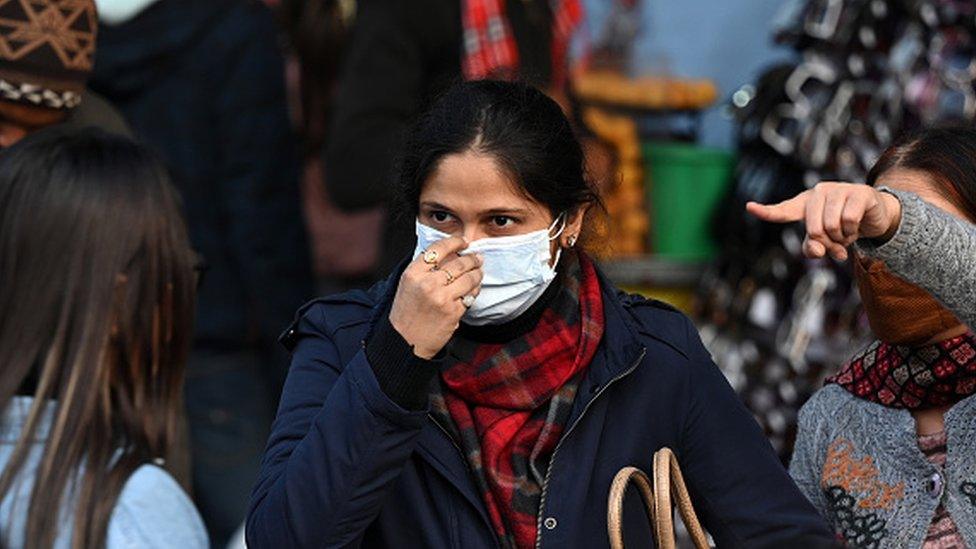Covid-19: PM Modi cautions India amid China coronavirus surge
- Published

The Indian government has asked people to return to Covid-appropriate behaviour
Indian Prime Minister Narendra Modi has urged people to start wearing masks again as the country steps up surveillance of Covid cases.
Mr Modi held a review meeting on Thursday amid a surge in cases in China which has put India on alert.
The prime minister called for increased testing and encouraged a return to Covid-appropriate behaviour.
India had relaxed its Covid rules, including mask-wearing, earlier this year after a drop in infection levels.
The country witnessed two deadly waves in 2020 and 2022 - and the government had come under heavy criticism for its handling of the second wave in the summer of 2021 when thousands died amid a lack of oxygen supplies and critical medicines.
At Thursday's meeting, Mr Modi asked states to ensure operational readiness of hospital infrastructure, including a healthy supply of oxygen cylinders and ventilators.
While there was no reason to panic, the prime minister cautioned against complacency and urged citizens to take all necessary precautions.
According to government data, India currently has only around 3,400 active coronavirus cases, but reports of the surge in China have created a sense of fear among many people.
Over the past few months, India has reported four Covid-19 cases , externalcaused by BF.7, the Omicron subvariant linked to a spike in cases in China.
The cases - three in Gujarat state and one in Odisha - were detected in July, September and November and the patients have recovered, health officials have said.
Several experts have said that India does not have reason to panic.
In Delhi, Chief Minister Arvind Kejriwal has assured the people that no case of the Covid variant has been detected in national capital.
In the southern state of Karnataka, the government has made Covid tests mandatory for flu-like symptoms and said masks may soon be mandatory in closed spaces.
Top health officials have asked people to get vaccinated and take booster doses. Over 2.2 billion Covid vaccine doses have been administered so far in the country, but only 27% of the population have taken the booster dose - which India calls a "precaution dose" - so far.
The government said it had no plans yet to stop flights from countries where new cases were reported. But the country has resumed random testing of international travellers at the airports.
On Thursday, India's health minister Mansukh Mandaviya said in parliament that though cases in China were rising, those in India were "depleting". He added that the ministry was closely monitoring new variants and advised states to increase genome sequencing.
On Twitter, the government also debunked a fake message circulating on WhatsApp regarding a subvariant of the Omicron strain.
Allow X content?
This article contains content provided by X. We ask for your permission before anything is loaded, as they may be using cookies and other technologies. You may want to read X’s cookie policy, external and privacy policy, external before accepting. To view this content choose ‘accept and continue’.

Earlier this week, the federal government asked states to send samples of all Covid positive patients to labs runs by a health ministry forum which monitors various strains of Covid in India.
Mr Mandaviya also asked states to encourage people to follow social distancing and other rules during the upcoming festive season. Chief ministers of several states have been reviewing their preparedness to deal with infections if needed.

Read more India stories from the BBC:

Related topics
- Published5 May 2022
- Published19 April 2021